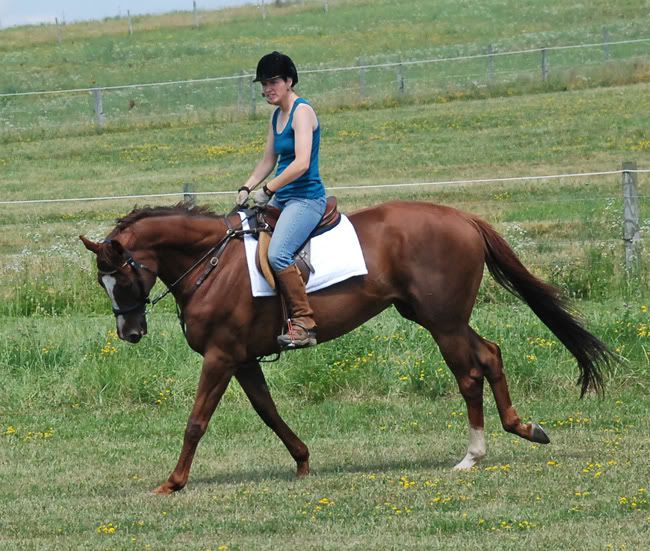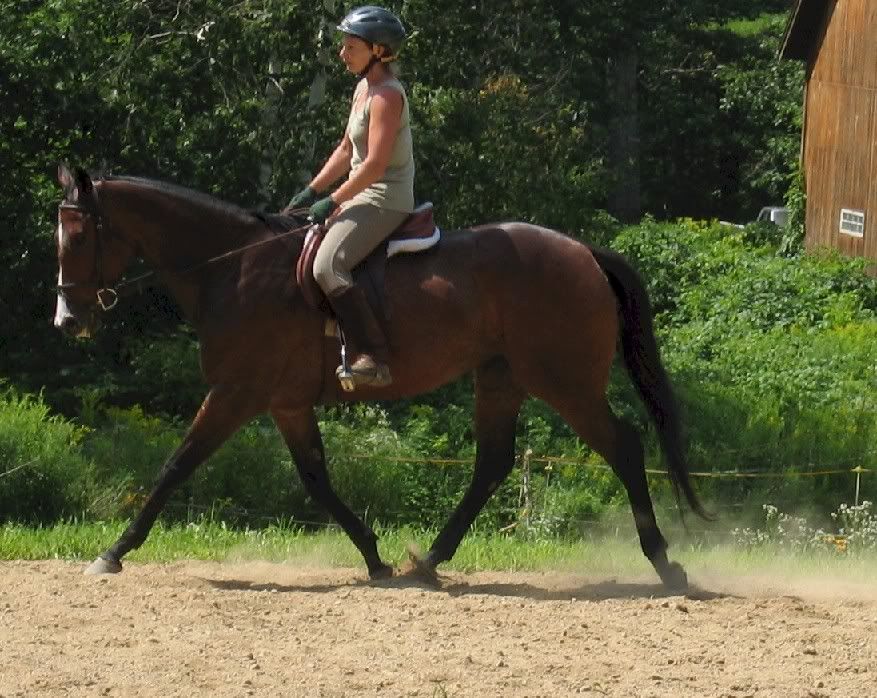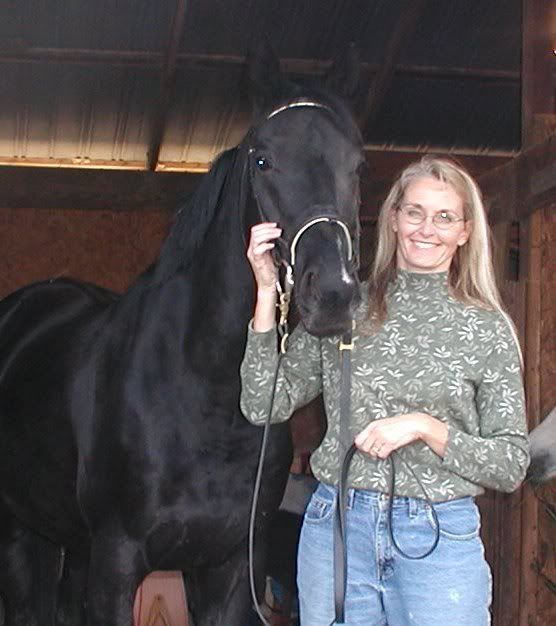Post by jenarby on Feb 18, 2003 0:45:07 GMT -5
I got this in my inbox this evening. I thought you all would be interested in hearing about it........This is not my writing it was forwarded from a friend...... 
You've probably heard about the new strain of neurologic equine herpes virus at Findlay University. Unfortunately, it seems to have spread from the 4 Findlay horses taken to Ohio State.
The information I have is from horse owners who have had contact with OSU Vet Med (including one confirmed case in a horse taken there for x-rays). So, yes, it's anecdotal, but the sources are directly involved. So far, other news has been amazingly scarce (there's a Yahoo(?) newsgroup with daily postings/updates. I haven't had time to look for it or to request the link. Ohio Horseman's Council is another good source.)
Here's what I know about the virus:
-It's a new strain of neurologic herpes. There is a lot of debate about whether the vaccine helps or makes horses more susceptible.
-So far, it has killed maybe 10-15% of exposed horses. Mortality rate is very high if the horse is untreated. If it's caught in time, diagnosed, and treated, most horses survive.
-It's highly contagious. It can be spread from horse to horse up to 30 feet through air. It can also be spread on people's clothing, boots, and equipment. The virus enters through mucus membrane (inhalation, eyes, nose). Since it is a virus, it is very hard to kill and can survive for some time outside of a host (horse). (An aside from me: 1 part bleach in 10 parts water is considered to be a standard treatment for any potentially contaminated surface. BUT, you must have it in contact for at least 20 minutes--30 is safer for viruses--in order to be sure you've killed everything on that surface. A quick wipe doesn't work.)
-Symptoms include fever, nasal discharge, loss of appetite, loss of coordination, weakness, shaking, falling down (very bad sign--these horses almost always die). Symptoms can progress pretty quickly (hours to a couple of days).
-The incubation period is about 2 weeks, before you get symptoms. Horses thought to be exposed are quarantined for 3 weeks.
-It really hasn't made the news, but there is at least one confirmed case in Knox County (linked directly to OSU). I know of several others who may also be. We heard by way of OU that there are more cases in Ohio and surrounding states.
Ohio State seems to be handling this very badly. They finally told their vet students three days ago that they have cases in the clinic, and I haven't seen a formal news release to the public. They also haven't told anyone which symptoms to watch for, and literally just admitted that it can be passed from horse to horse on people's shoes. Here's the kicker: OSU has had uncontained herpes cases for at least a week to 10 days. Deb and Mark (the owners of our barn) just found out that when they took their horse Lucky to ICU early last week that the dead horse across the aisle had died from herpes. So OSU had at least one case in general ICU instead of isolation, and almost certainly herpes has been spread throughout the equine hospital and anywhere people who were in the hospital at the time went (which would be how a horse going to Ortho--in a completely different part of the complex--for x-rays caught it). So, it can survive on people's clothes, and OSU allowed it to be spread. I don't know how many horses and people leave that vet hospital every day, and any of them could be carriers.
Here's the other reason people are so mad: OSU still isn't telling people that their horses may be at risk. HPV is treatable. If you and your vet know what to look for and you catch it early, horses don't have to die from it.
Y'all, I don't want to be alarmist. But a lot of horse people in central Ohio are scared and angry (last night I heard "sue OSU" and "call the media"). We had a horse from our farm go to OSU last week for x-rays, and it's in quarantine (it probably wasn't exposed, but they're not taking chances). Rardin's horse in ICU is staying there for 3 weeks at OSU's expense, to make sure she doesn't have it. Deb and Mark are also taking random temperatures and watching for signs of illness at our barn. They're not allowing new horses to come here for a while, and everyone who's been to another barn is supposed to wash and change clothes/boots before coming to ours.
Hopefully this is all contained soon, but in the meantime I figured you'd all like to know what we've learned this week....

You've probably heard about the new strain of neurologic equine herpes virus at Findlay University. Unfortunately, it seems to have spread from the 4 Findlay horses taken to Ohio State.
The information I have is from horse owners who have had contact with OSU Vet Med (including one confirmed case in a horse taken there for x-rays). So, yes, it's anecdotal, but the sources are directly involved. So far, other news has been amazingly scarce (there's a Yahoo(?) newsgroup with daily postings/updates. I haven't had time to look for it or to request the link. Ohio Horseman's Council is another good source.)
Here's what I know about the virus:
-It's a new strain of neurologic herpes. There is a lot of debate about whether the vaccine helps or makes horses more susceptible.
-So far, it has killed maybe 10-15% of exposed horses. Mortality rate is very high if the horse is untreated. If it's caught in time, diagnosed, and treated, most horses survive.
-It's highly contagious. It can be spread from horse to horse up to 30 feet through air. It can also be spread on people's clothing, boots, and equipment. The virus enters through mucus membrane (inhalation, eyes, nose). Since it is a virus, it is very hard to kill and can survive for some time outside of a host (horse). (An aside from me: 1 part bleach in 10 parts water is considered to be a standard treatment for any potentially contaminated surface. BUT, you must have it in contact for at least 20 minutes--30 is safer for viruses--in order to be sure you've killed everything on that surface. A quick wipe doesn't work.)
-Symptoms include fever, nasal discharge, loss of appetite, loss of coordination, weakness, shaking, falling down (very bad sign--these horses almost always die). Symptoms can progress pretty quickly (hours to a couple of days).
-The incubation period is about 2 weeks, before you get symptoms. Horses thought to be exposed are quarantined for 3 weeks.
-It really hasn't made the news, but there is at least one confirmed case in Knox County (linked directly to OSU). I know of several others who may also be. We heard by way of OU that there are more cases in Ohio and surrounding states.
Ohio State seems to be handling this very badly. They finally told their vet students three days ago that they have cases in the clinic, and I haven't seen a formal news release to the public. They also haven't told anyone which symptoms to watch for, and literally just admitted that it can be passed from horse to horse on people's shoes. Here's the kicker: OSU has had uncontained herpes cases for at least a week to 10 days. Deb and Mark (the owners of our barn) just found out that when they took their horse Lucky to ICU early last week that the dead horse across the aisle had died from herpes. So OSU had at least one case in general ICU instead of isolation, and almost certainly herpes has been spread throughout the equine hospital and anywhere people who were in the hospital at the time went (which would be how a horse going to Ortho--in a completely different part of the complex--for x-rays caught it). So, it can survive on people's clothes, and OSU allowed it to be spread. I don't know how many horses and people leave that vet hospital every day, and any of them could be carriers.
Here's the other reason people are so mad: OSU still isn't telling people that their horses may be at risk. HPV is treatable. If you and your vet know what to look for and you catch it early, horses don't have to die from it.
Y'all, I don't want to be alarmist. But a lot of horse people in central Ohio are scared and angry (last night I heard "sue OSU" and "call the media"). We had a horse from our farm go to OSU last week for x-rays, and it's in quarantine (it probably wasn't exposed, but they're not taking chances). Rardin's horse in ICU is staying there for 3 weeks at OSU's expense, to make sure she doesn't have it. Deb and Mark are also taking random temperatures and watching for signs of illness at our barn. They're not allowing new horses to come here for a while, and everyone who's been to another barn is supposed to wash and change clothes/boots before coming to ours.
Hopefully this is all contained soon, but in the meantime I figured you'd all like to know what we've learned this week....








